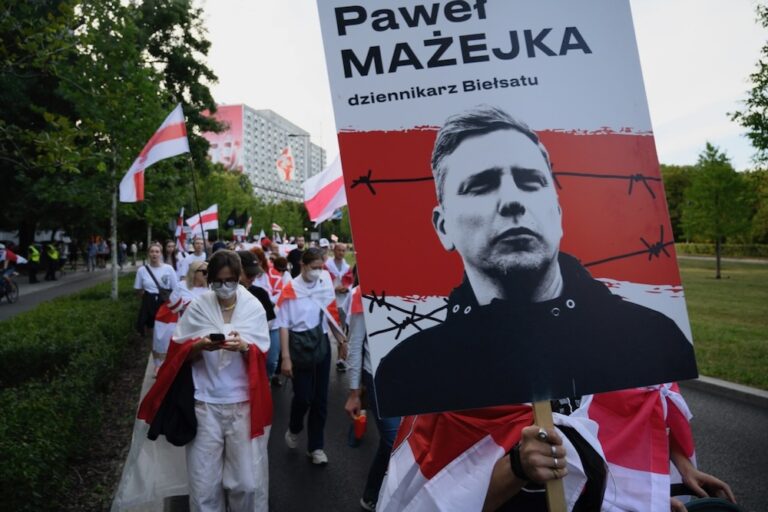(RSF/IFEX) – RSF has called on those investigating the murder of Veronika Cherkasova to explore the possibility that the crime was linked to her work as a journalist, rather than focussing on the theory of a crime of passion and trying at all costs to implicate her family. Cherkasova was found stabbed to death in […]
(RSF/IFEX) – RSF has called on those investigating the murder of Veronika Cherkasova to explore the possibility that the crime was linked to her work as a journalist, rather than focussing on the theory of a crime of passion and trying at all costs to implicate her family. Cherkasova was found stabbed to death in her Minsk home on 20 October 2004.
The organisation lamented the fact that chief investigator Vladimir Chumachenko ordered a new psychiatric examination of Cherkasova’s 15-year-old son, Anton Filimonov, on 31 January 2005, despite evidence that the journalist was investigating a possible arms deal between the Belarusian government and Saddam Hussein at the time of her death.
Chumachenko, who headed the unsuccessful investigation into the disappearance of cameraman Dmitri Zavadski in 2000, said in a 10 February interview with Radio Free Europe/Radio Liberty, “We do not exclude any hypothesis in Veronika Cherkasova’s murder, not even the presence of Martians.”
RSF noted, “Several facts seem to support the argument that Cherkasova was murdered because she was working on a particularly sensitive investigation. We hope that the investigation headed by Vladimir Chumachenko will be carried out with complete impartiality and with the desire to shed full light on this case, and we therefore call on him and the interior minister to consider the theory that seems most probable to us, that she was killed because of her work as a journalist.”
On 21 January, Sergei Satsuk, a reporter with the independent daily “Belorusskaya Delovaya Gazeta”, corroborated the theory that the murder was linked to Cherkasova’s work. Quoting a criminologist’s findings, Satsuk said the journalist was probably murdered by a professional killer who tampered with the murder scene to make it look like a crime of passion. He argued that the killer most likely smeared her blood on the walls after she was already dead to make it look like a family quarrel that had gone too far. No other sign of struggle was found in the apartment, aside from a broken glass on a carpet. Blood was also found on the victim’s notebook but investigators have not yet determined what the killer was looking for.
A month before her death, Cherkasova was investigating possible arms sales to Saddam Hussein by the Belarusian government, as well as a money laundering scheme. Her investigation focussed on the financing of military contracts with Iraq by a company called Infobank. She had had several meetings in Minsk with a former Infobank consultant who had worked on the Iraq contracts and whom she had first met three years earlier on a press trip to Baghdad organised by the company.
The murder investigation, however, is currently focussing on Cherkasova’s family. Minsk’s first deputy prosecutor, Nikolai Starovoitov, has signed Chumachenko’s request for another psychiatric examination of Filimonov. Investigators have justified the new examination by saying the journalist’s son was not cooperative during interrogation. One of the aims of the examination would be to determine if Filimonov was psychologically disturbed at the time of his mother’s murder.
On 1 February, investigators from the Prosecutor’s Office went to Filimonov’s school to take him to a psychiatric hospital, but he ran away and went to his grandparents’ home. The next day, he flew to Moscow to join his father, a journalist with the daily “Izvestias”. On 22 February, a request by the journalist’s mother, Diana Cherkasova, to cancel a judge’s ruling ordering a new psychiatric examination of her grandson was rejected by a Minsk court, following an in camera session. The decision was due to come before an appeals court on 4 March.
Filimonov was already in a psychiatric hospital from 29 November to 16 December 2004, suffering from post-traumatic depression.
Vladimir Melechko, Cherkasova’s father-in-law, is also regarded as a suspect. Concerned when he was unable to reach her by phone, Melechko went to the journalist’s home and discovered her body. She had been stabbed 12 times.
Chumachenko was the official in charge of investigating the Zavadski case. Zavadski, a cameraman with the ORT television station, disappeared on 7 July 2000. Four years later, the case is closed, despite the fact that those responsible for the cameraman’s kidnapping have never been identified and the possible involvement of senior officials was never properly investigated.


